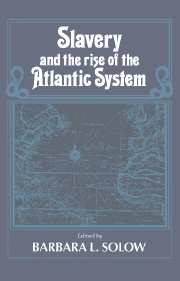Book contents
- Frontmatter
- Contents
- Preface
- List of contributors
- Introduction
- 1 Slavery and colonization
- 2 The Old World background of slavery in the Americas
- 3 Slavery and lagging capitalism in the Spanish and Portuguese American empires, 1492–1713
- 4 The Dutch and the making of the second Atlantic system
- 5 Precolonial western Africa and the Atlantic economy
- 6 A marginal institution on the margin of the Atlantic system: The Portuguese southern Atlantic slave trade in the eighteenth century
- 7 The apprenticeship of colonization
- 8 Exports and the growth of the British economy from the Glorious Revolution to the Peace of Amiens
- 9 The slave and colonial trade in France just before the Revolution
- 10 Slavery, trade, and economic growth in eighteenth-century New England
- 11 Economic aspects of the growth of slavery in the seventeenth-century Chesapeake
- 12 Credit in the slave trade and plantation economies
- Index
10 - Slavery, trade, and economic growth in eighteenth-century New England
Published online by Cambridge University Press: 20 October 2009
- Frontmatter
- Contents
- Preface
- List of contributors
- Introduction
- 1 Slavery and colonization
- 2 The Old World background of slavery in the Americas
- 3 Slavery and lagging capitalism in the Spanish and Portuguese American empires, 1492–1713
- 4 The Dutch and the making of the second Atlantic system
- 5 Precolonial western Africa and the Atlantic economy
- 6 A marginal institution on the margin of the Atlantic system: The Portuguese southern Atlantic slave trade in the eighteenth century
- 7 The apprenticeship of colonization
- 8 Exports and the growth of the British economy from the Glorious Revolution to the Peace of Amiens
- 9 The slave and colonial trade in France just before the Revolution
- 10 Slavery, trade, and economic growth in eighteenth-century New England
- 11 Economic aspects of the growth of slavery in the seventeenth-century Chesapeake
- 12 Credit in the slave trade and plantation economies
- Index
Summary
IN their recent study of colonial British America, McCusker and Menard bemoan the fact that, despite considerable research over the last two decades on colonial New England's demography and society, “[e]conomic issues have seldom commanded center stage in New England studies.” As a result, they claim, “recent work has as yet failed to yield much insight into the operation of the economy.” Nevertheless, noting that New England “lacked a major staple commodity to export to the metropolis” but needed under the pressure of rapid population growth “to import countless things from abroad,” they argue that New Englanders became “the Dutch of England's empire,” creating “a well-integrated commercial economy based on the carrying trade.” It is, they conclude, “in the interactions between the push of population growth and the pull of market opportunities that answers to the central questions in New England social and economic history are likely to be found.”
Seeking to integrate research on New England demography with that on the region's economy, the approach advocated by McCusker and Menard requires, as they themselves admit, a fuller understanding of both the pattern of growth in the export sector and the relationship between trade and economic development in the region. A comprehensive treatment of these issues cannot be attempted in this chapter, not least because much of the detailed work required to trace the patterns and levels of New England trade throughout the colonial period remains to be done.
- Type
- Chapter
- Information
- Slavery and the Rise of the Atlantic System , pp. 237 - 264Publisher: Cambridge University PressPrint publication year: 1991
- 2
- Cited by



